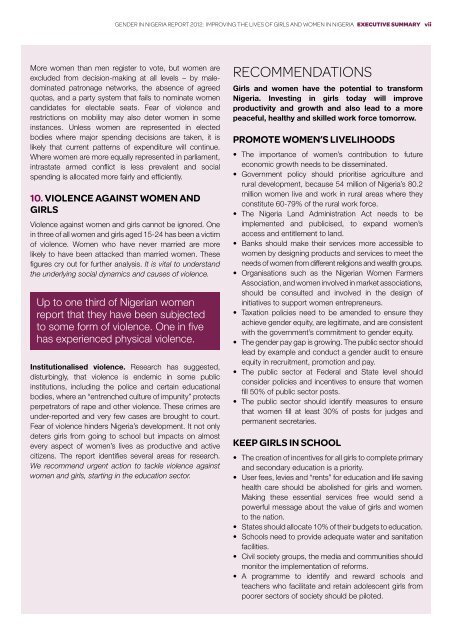Gender in niGeria report 2012 - Economic Commission for Africa
Gender in niGeria report 2012 - Economic Commission for Africa
Gender in niGeria report 2012 - Economic Commission for Africa
Create successful ePaper yourself
Turn your PDF publications into a flip-book with our unique Google optimized e-Paper software.
<strong>Gender</strong> <strong>in</strong> Nigeria Report <strong>2012</strong>: Improv<strong>in</strong>g the Lives of Girls and Women <strong>in</strong> Nigeria executive summary vii<br />
More women than men register to vote, but women are<br />
excluded from decision-mak<strong>in</strong>g at all levels – by maledom<strong>in</strong>ated<br />
patronage networks, the absence of agreed<br />
quotas, and a party system that fails to nom<strong>in</strong>ate women<br />
candidates <strong>for</strong> electable seats. Fear of violence and<br />
restrictions on mobility may also deter women <strong>in</strong> some<br />
<strong>in</strong>stances. Unless women are represented <strong>in</strong> elected<br />
bodies where major spend<strong>in</strong>g decisions are taken, it is<br />
likely that current patterns of expenditure will cont<strong>in</strong>ue.<br />
Where women are more equally represented <strong>in</strong> parliament,<br />
<strong>in</strong>trastate armed conflict is less prevalent and social<br />
spend<strong>in</strong>g is allocated more fairly and efficiently.<br />
10. Violence aga<strong>in</strong>st women and<br />
girls<br />
Violence aga<strong>in</strong>st women and girls cannot be ignored. One<br />
<strong>in</strong> three of all women and girls aged 15-24 has been a victim<br />
of violence. Women who have never married are more<br />
likely to have been attacked than married women. These<br />
figures cry out <strong>for</strong> further analysis. It is vital to understand<br />
the underly<strong>in</strong>g social dynamics and causes of violence.<br />
Up to one third of Nigerian women<br />
<strong>report</strong> that they have been subjected<br />
to some <strong>for</strong>m of violence. One <strong>in</strong> five<br />
has experienced physical violence.<br />
Institutionalised violence. Research has suggested,<br />
disturb<strong>in</strong>gly, that violence is endemic <strong>in</strong> some public<br />
<strong>in</strong>stitutions, <strong>in</strong>clud<strong>in</strong>g the police and certa<strong>in</strong> educational<br />
bodies, where an “entrenched culture of impunity” protects<br />
perpetrators of rape and other violence. These crimes are<br />
under-<strong>report</strong>ed and very few cases are brought to court.<br />
Fear of violence h<strong>in</strong>ders Nigeria’s development. It not only<br />
deters girls from go<strong>in</strong>g to school but impacts on almost<br />
every aspect of women’s lives as productive and active<br />
citizens. The <strong>report</strong> identifies several areas <strong>for</strong> research.<br />
We recommend urgent action to tackle violence aga<strong>in</strong>st<br />
women and girls, start<strong>in</strong>g <strong>in</strong> the education sector.<br />
Recommendations<br />
Girls and women have the potential to trans<strong>for</strong>m<br />
Nigeria. Invest<strong>in</strong>g <strong>in</strong> girls today will improve<br />
productivity and growth and also lead to a more<br />
peaceful, healthy and skilled work <strong>for</strong>ce tomorrow.<br />
Promote women’s livelihoods<br />
• The importance of women’s contribution to future<br />
economic growth needs to be dissem<strong>in</strong>ated.<br />
• Government policy should prioritise agriculture and<br />
rural development, because 54 million of Nigeria’s 80.2<br />
million women live and work <strong>in</strong> rural areas where they<br />
constitute 60-79% of the rural work <strong>for</strong>ce.<br />
• The Nigeria Land Adm<strong>in</strong>istration Act needs to be<br />
implemented and publicised, to expand women’s<br />
access and entitlement to land.<br />
• Banks should make their services more accessible to<br />
women by design<strong>in</strong>g products and services to meet the<br />
needs of women from different religions and wealth groups.<br />
• Organisations such as the Nigerian Women Farmers<br />
Association, and women <strong>in</strong>volved <strong>in</strong> market associations,<br />
should be consulted and <strong>in</strong>volved <strong>in</strong> the design of<br />
<strong>in</strong>itiatives to support women entrepreneurs.<br />
• Taxation policies need to be amended to ensure they<br />
achieve gender equity, are legitimate, and are consistent<br />
with the government’s commitment to gender equity.<br />
• The gender pay gap is grow<strong>in</strong>g. The public sector should<br />
lead by example and conduct a gender audit to ensure<br />
equity <strong>in</strong> recruitment, promotion and pay.<br />
• The public sector at Federal and State level should<br />
consider policies and <strong>in</strong>centives to ensure that women<br />
fill 50% of public sector posts.<br />
• The public sector should identify measures to ensure<br />
that women fill at least 30% of posts <strong>for</strong> judges and<br />
permanent secretaries.<br />
Keep girls <strong>in</strong> school<br />
• The creation of <strong>in</strong>centives <strong>for</strong> all girls to complete primary<br />
and secondary education is a priority.<br />
• User fees, levies and “rents” <strong>for</strong> education and life sav<strong>in</strong>g<br />
health care should be abolished <strong>for</strong> girls and women.<br />
Mak<strong>in</strong>g these essential services free would send a<br />
powerful message about the value of girls and women<br />
to the nation.<br />
• States should allocate 10% of their budgets to education.<br />
• Schools need to provide adequate water and sanitation<br />
facilities.<br />
• Civil society groups, the media and communities should<br />
monitor the implementation of re<strong>for</strong>ms.<br />
• A programme to identify and reward schools and<br />
teachers who facilitate and reta<strong>in</strong> adolescent girls from<br />
poorer sectors of society should be piloted.

















